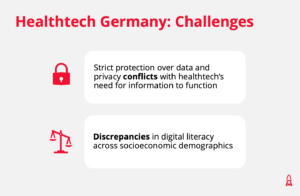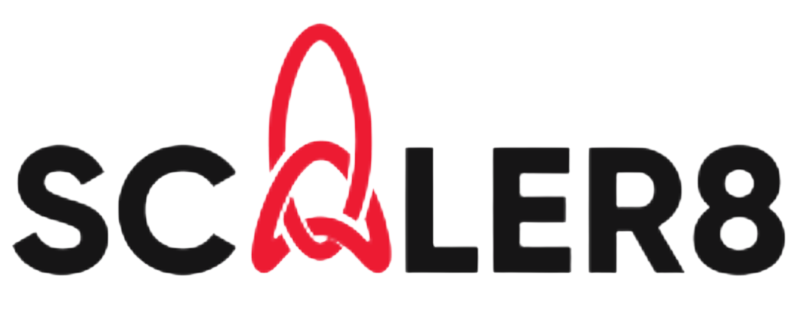Boasting a mature technology market and a successful healthcare system with at least 90% of their population insured, international healthtech startups are moving full steam ahead in Europe’s largest healthcare market.

Digital health products have seen tremendous growth in Germany in recent years, where over 270 digital health technology businesses and 177 telemedicine projects are being implemented, with the country’s digital health economy to be expected to grow to €38 billion by 2025 according to the Federal Ministry for Economic Affairs and Energy.
Germany also stands as one of the digital healthcare’s greatest pioneers, as it became the first country in the world to establish a combined regulatory and reimbursement process for digital e-health applications.
The use of digital technologies is swiftly increasing, with both patients and healthcare providers greatly benefiting from new apps and technology. Services such as unified electronic health records, E-prescriptions, clinicians’ virtual assistants (AI), teleconsultation, E-triage and Radio-Frequency Identification (RFID) tracking have been estimated to save a whopping total of €30 billion.
Patients are also experiencing improved quality of life through the use of self-care management tools such as remote digital diagnostic tools, virtual reality for pain management and e-booking services.

The move to integrate healthtech in the sector has been significantly encouraged by the nation’s legislative framework, as policies to digitalise healthcare — from patient records to telemedicine prescriptions — were implemented eagerly after Germany was placed second-to-last on Bertelsmann Stiftung’s 2018 Digital Health Index ranking among 17 countries.
Some have attributed Germany’s previously-lacking healthcare digitalisation to the German healthcare system, which follows a principle of self-governance whereby the government drafts a legislative framework and implementation depends on individual stakeholders (doctors, hospitals, pharmacists). This has proven to be a large obstacle when nationwide digital projects are executed and implemented.
In response, Health Minister Jens Spahn officially launched the Health Innovation Hub (HIH) in April 2019 as a new initiative to transform Germany’s healthcare system digitally.
Opportunities aplenty for digital health innovators

November 2019 – Digital Care Act (DVG)
In November of the same year, Germany approved the Act to Improve Healthcare Provision through Digitalisation and Innovation (Digitale-Versorgung-Gesetz – DVG), which allowed doctors to prescribe digital health applications (DiGas) that can later be reimbursed by health insurance companies.
With more than 318,000 health-related mobile apps available and approximately 200 apps being launched daily, the healthtech market is a brimming gold mine for developers.
October 2020 – Hospital Future Act (KHZG)
Under the Hospital Future Act, German public hospitals will receive €4.3 billion for digital health innovation. Hospitals can use the funding to invest in digitisation and automation initiatives such as patient portals, digital medication management, robotic systems, and high-tech medical equipment.
International healthtech startups such as Scaler8’s Market Access participant, Holmusk, are capitalising on this opportunity as Germany steps up the race to catch up with digitisation.
June 2021 – Digital Healthcare and Nursing Care Modernisation Act (DVPMG)
DVPMG aims to integrate digital health applications to improve the quality and availability of nursing care to increase patient autonomy and simplify processes such as telemedicine and electronic documentation. Digital nursing services can also be reimbursed by health insurance companies similar to DiGa’s reimbursement.
Examples of digital nursing care applications include technology that helps with medication intake, brain training applications, alarm systems for fall risk patients etc.
Getting started
Healthtech startups that are interested in starting a business in Germany must first register their app at the Federal Institute for Drugs and Medical Devices (BfArM) and follow its criteria list of 122 security and functional features.
After the app has been approved, developers will be provisionally reimbursed for one year if they can offer data evidence of their app improving patient care in practical ways during this time period.
Examples of improvements to a patient’s quality of life include consistent receiving of medication, better treatment coordination and reduction of financial burdens.
Challenges faced by healthtech startups In Germany

Many new government-led initiatives and laws have been passed to ease and accelerate the development of Germany’s digital healthcare infrastructure. However, many difficulties are seemingly still here to stay.
One main challenge is the Germans’ strict protectiveness over personal privacy and information. It poses a direct conflict with the basic premise of healthcare apps as they require constant input of personal data to provide basic functions.
Wide discrepancies in digital literacy across different socioeconomic demographics also pose major problems when it comes to the accessibility of healthtech among the country, with the poor and elderly being the greatest at risk of being left out, despite them being the most in need of such services.
Startups looking to enter Germany are encouraged to prioritise acquiring German healthcare experts or investors on board in the early stages, therefore unlocking access to their local knowledge and network to facilitate entering the German healthcare technology market.
Keen on more German healthcare insights?
Navigate the German healthcare and life sciences industry with us here.




